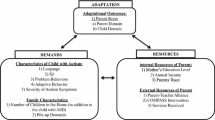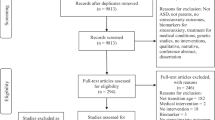Abstract
There is increasing international interest in intensive home-based behavioral intervention for children with autism. In the present study, 141 UK parents conducting such interventions completed a questionnaire addressing issues of stress, coping, and support. Regression analyses showed that parents' stress levels were predicted mainly by psychological rather than demographic variables. In particular, adaptive coping strategies, informal social support sources, and beliefs about the efficacy of the intervention were associated with lower reported stress and higher levels of autism symptomatology were associated with higher reported stress. There was also evidence that the use of Passive Appraisal coping and beliefs about the efficacy of the interventions moderated the effects of autism symptomatology on parents' pessimism. Implications of these findings for future research and for the support of families engaged in intensive home-based behavioral intervention are discussed.
Similar content being viewed by others

REFERENCES
Aiken, L. S., & West, S. G. (1991). Multiple regression: Testing and interpreting interactions. Newbury Park, CA: Sage.
Anderson, S. R., Avery, D. L., DiPietro, E. K., Edwards, G. L., & Christian, W. P. (1987). Intensive home-based intervention with autistic children. Education and Treatment of Children, 10, 352-366.
Baron, R. M., & Kenny, D. A. (1986). The moderator-mediator variable distinction in social psychological research: Conceptual, strategic, and statistical considerations. Journal of Personality and Social Psychology, 51, 1173-1182.
Bebko, J. M., Konstantareas, M. M., & Springer, J. (1987). Parent and professional evaluations of family stress associated with characteristics of autism. Journal of Autism and Developmental Disorders, 17, 565-576.
Beresford, B. A. (1994). Resources and strategies: How parents cope with the care of a disabled child. Journal of Child Psychology and Psychiatry, 35, 171-209.
Birnbrauer, J. S., & Leach, D. J. (1993). The Murdoch Early Intervention Program after two years. Behaviour Change, 10, 63-74.
Brinker, R. P., Seifer, R., & Sameroff, A. J. (1994). Relations among maternal stress, cognitive development, and early intervention in middle-and low-SES infants with developmental disabilities. American Journal on Mental Retardation, 98, 463-480.
Bristol, M. M., Gallagher, J. J., & Holt, K. D. (1993). Maternal depressive symptoms in autism: Response to psychoeducational intervention. Rehabilitation Psychology, 38, 3-10.
Cattell-Gordon, D., & Cattell-Gordon, D. (1998). The development of an effective applied behavior analysis program for a young child with autism: A parent's perspective. Infants and Young Children, 10, 79-85.
DeMeyer, M. R., Hingtgen, J. N., & Jackson, R. K. (1981). Infantile autism reviewed: A decade of research. Schizophrenia Bulletin, 7, 388-451.
Dunst, C. J., Jenkins, V., & Trivette, C. M. (1984). The Family Support Scale: Reliability and validity. Journal of Individual, Family, and Community Wellness, 1, 45-52.
Factor, D. C., Perry, A., & Freeman, N. (1990). Stress, social support, and respite care use in families with autistic children. Journal of Autism and Developmental Disorders, 20, 139-146.
Floyd, F. J., & Gallagher, E. M. (1997). Parental stress, care demands, and use of support services for school-age children with disabilities and behavior problems. Family Relations, 46, 359-371.
Friedrich, W. N., Greenberg, M. T., & Crnic, K. (1983). A short form of the Questionnaire on Resources and Stress. American Journal of Mental Deficiency, 88, 41-48.
Gill, M. J., & Harris, S. L. (1991). Hardiness and social support as predictors of psychological discomfort in mothers of children with autism. Journal of Autism and Developmental Disorders, 21, 407-416.
Glidden, L. M., & Floyd, F. J. (1997). Disaggregating parental depression and family stress in assessing families of children with developmental disabilities: A multi-sample analysis. American Journal on Mental Retardation, 102, 250-266.
Greenberg, M. T. (1983). Family stress and child competence: The effects of early intervention for families with deaf infants. American Annals of the Deaf, 128, 407-417.
Gresham, F. M., & MacMillan, D. L. (1997). Autistic recovery? An analysis and critique of the empirical evidence on the Early Intervention Project. Behavioral Disorders, 22, 185-201.
Kazdin, A. E. (1993). Replication and extension of behavioral treatment for autistic disorder. American Journal on Mental Retardation, 97, 377-379.
Koegel, R. L., Schreibman, L., Loos, L. M., Dirlich-Wilheim, H., Dunlap, G., Robbins, F. R., & Plienis, A. J. (1992). Consistent stress profiles in mothers of children with autism. Journal of Autism and Developmental Disorders, 22, 205-216.
Konstantareas, M. M., & Homatidis, S. (1989). Assessing child symptom severity and stress in parents of autistic children. Journal of Child Psychology and Psychiatry, 30, 459-470.
Krug, D. A., Arick, J., & Almond, P. (1980). Behaviour checklist for identifying severely handicapped individuals with high levels of autistic behaviour. Journal of Child Psychology and Psychiatry, 21, 221-229.
Lazarus, R. S., & Folkman, S. (1984). Stress, appraisal and coping. New York: Springer.
Leach, L. R., Frank, R. G., Bouman, D. E., & Farmer, J. (1994). Family functioning, social support and depression after traumatic brain injury. Brain Injury, 8, 599-606.
Lovaas, O. I. (1987). Behavioural treatment and normal educational and intellectual functioning in young autistic children. Journal of Consulting and Clinical Psychology, 55, 3-9.
Lovaas, O. I., Smith, T., & McEachin, J. J. (1989). Clarifying comments on the young autism study: Reply to Schopler, Short and Mesibov. Journal of Consulting and Clinical Psychology, 57, 165-167.
McConachie, H., & Waring, M. (1997). Child Psychology Portfolio: Parental Coping and Support. Windsor, UK: NFER-Nelson.
McCubbin, H. I., Olson, D. H., & Larsen, A. S. (1991). F-COPES (Family Crisis Oriented Personal Evaluation Scales). In H. I. McCubbin, & A. I. Thompson (Eds.), Family assessment inventories for research and practice (pp. 193-207). Madison, WI: University of Wisconsin-Madison.
McCubbin, H. I., & Patterson, J. M. (1983). The family stress process: The Double ABCX model of adjustment and adaptation. In H. I. McCubbin, M. B. Sussman, & J. M. Patterson (Eds.), Social stress and the family: Advances and developments in family stress theory and research (pp. 7-37). New York: Haworth Press.
McEachin, J. J., Smith, T., & Lovaas, O. I. (1993). Long-term outcome for children with autism who received early intensive behavioural treatment. American Journal on Mental Retardation, 97, 359-372.
McKinney, B., & Peterson, R. A. (1987). Predictors of stress in parents of developmentally disabled children. Journal of Pediatric Psychology, 12, 133-150.
Mesibov, G. B. (1993). Treatment outcome is encouraging. American Journal on Mental Retardation, 97, 379-380.
Miller, A. C., Gordon, R. M., Daniele, R. J., & Diller, L. (1992). Stress, appraisal, and coping in mothers of disabled and nondisabled children. Journal of Pediatric Psychology, 17, 587-605.
Minnes, P., McShane, J., Forkes, S., Green, S., Clement, B., & Card, L. (1989). Coping resources of parents of developmentally handicapped children living in rural communities. Australia and New Zealand Journal of Developmental Disabilities, 15, 109-118.
Robbins, F. R., Dunlap, G., & Plienis, A. J. (1991). Family characteristics, family training, and the progress of young children with autism. Journal of Early Intervention, 15, 173-184.
Rutter, M. (1985). Resilience in the face of adversity: Protective factors and resistance to psychiatric disorder. British Journal of Psychiatry, 147, 598-611.
Schopler, E., Short, A., & Mesibov, G. B. (1989). Relation of behavioral treatment to “normal functioning:” Comment on Lovaas. Journal of Consulting and Clinical Psychology, 57, 162-164.
Sevin, J. A., Matson, J. L., Coe, D. A., Fee, V. E., & Sevin, B. M. (1991). A comparison and evaluation of three commonly used autism scales. Journal of Autism and Developmental Disorders, 21, 417-432.
Sheinkopf, S., & Siegal, B. (1998). Home-based behavioral treatment for young autistic children. Journal of Autism and Developmental Disorders, 28, 15-23.
Smith, T. (1999). Outcome of early intervention for children with autism. Clinical Psychology: Science and Practice, 6, 33-49.
Smith, T., Eikeseth, S., Klevstrand, M., & Lovaas, O. I. (1997). Intensive behavioral treatment for preschoolers with severe mental retardation and pervasive developmental disorder. American Journal on Mental Retardation, 102, 238-249.
Smith, T., & Lovaas, O. I. (1997). The UCLA Young Autism Project: A reply to Gresham and MacMillan. Behavioral Disorders, 22, 202-218.
Volkmar, F. R., Cicchetti, D. V., Dykens, E., Sparrow, S. S., Leckman, J. F., & Cohen, D. J. (1988). An evaluation of the Autism Behavior Checklist. Journal of Autism and Developmental Disorders, 18, 81-97.
Wadden, N. P. K., Bryson, S. E., & Rodger, R. S. (1991). A closer look at the Autism Behavior Checklist: Discriminant validity and factor structure. Journal of Autism and Developmental Disorders, 21, 529-541.
Wallander, J. L., & Varni, J. W. (1998). Effects of pediatric chronic physical disorders on child and family adjustment. Journal of Child Psychology and Psychiatry, 39, 29-46.
Author information
Authors and Affiliations
Rights and permissions
About this article
Cite this article
Hastings, R.P., Johnson, E. Stress in UK Families Conducting Intensive Home-Based Behavioral Intervention for Their Young Child with Autism. J Autism Dev Disord 31, 327–336 (2001). https://doi.org/10.1023/A:1010799320795
Issue Date:
DOI: https://doi.org/10.1023/A:1010799320795



